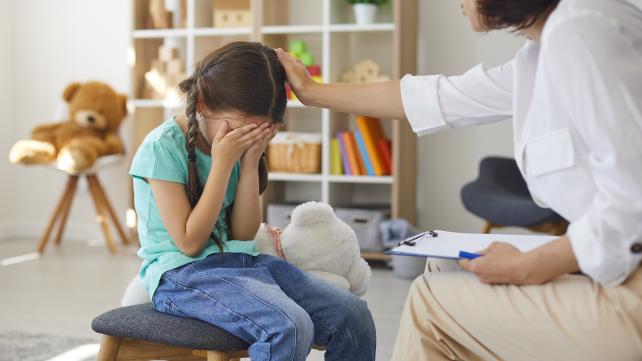
Our children are growing up in a time when stress, anxiety, and depression are at all time highs. It’s not new, families of faith are not immune, and it just isn’t enough to tell our children to “have sabr” or “pray more.”
Of course prayer and sabr (patience) are vital and necessary parts of our lives, but to really help our children navigate their lives in a way that benefits their mental health, growth, and development, we also need to actively work to build their “Emotional Intelligence.”
As a mother, I often wonder about how to be successful with my own family. So, I reached out to Ruba Qasem, Licensed Associate Counselor with degrees in Early Childhood Education and Clinical Mental Health Counseling and homeschooling mother of two, for help. In the following interview, she defines Emotional Intelligence and how it helps our children grow.
MB: What is Emotional Intelligence?
RQ: Emotional Intelligence (EI) is a mix of things. The official Google/ Oxford definition says, “the capacity to be aware of, control, and express one’s emotions, and to handle interpersonal relationships judiciously and empathetically.”
Many people confuse EI to mean “my kid knows how to express their emotions.” The assumption is that it’s just that, but there is so much more to it. Others think emotional intelligence means that you know how to regulate, which is one aspect of it, but it doesn’t mean that just because your child is having tantrums they cannot be emotionally intelligent.
If we were to separate Emotional Intelligence into topics, there would be five factors:
- Self-Awareness
- Motivation to Express Emotions
- Regulation
- Social Skills
- Empathy
Self-awareness is a big struggle for some families, to have children and adults around who are self-aware. Some may be aware of their emotions but may not be able to express them. Once you are aware and can express the emotion, the third step is to be able to regulate (or cope). The last two, social skills and empathy, work together in social situations.
Research shows that highly emotionally intelligent individuals tend to have more outgoing, assertive traits because they are able to express themselves and communicate their needs better.
MB: Why is emotional intelligence important for our children to learn?
RQ: It is essential to learn emotional intelligence as children because the first five to six years are the most formative.
If they don’t learn this now - if their emotions are not validated or not recognized or if they aren’t allowed to express their emotions - they’re going to become adults who struggle emotionally. They will not properly function in their jobs or in their role as parents or in any kind of field as adults if they are not emotionally intelligent. There is going to be a disconnect as it affects their interpersonal relationships and the way they see the world.
Emotional Intelligence needs to be taught at home. Our children are not going to learn this in school. Society will not teach our children how to regulate.
MB: Tell me more about the impact of high or low Emotional Intelligence on a child’s identity.
RQ: The more in tune you are with your emotions as a child, the more self-control you have which gives you an auto boost in confidence. But if a child is being told what to express and how to express it, they feel like they don't have the power or worth to make their own decisions.
Some adults don't accept a range of emotions and they don't allow their children to feel a range of emotions either. They say things like "don't cry," "if you're good and you're quiet," “don't be mad," or “you don’t have a reason to feel sad.”
But to a child, if the parents are dictating what and when and where they are allowed to feel, that child is going to grow to believe that their self-worth and identity is based on others. The more you validate and allow them to express a range of emotions, the more control they will feel they have and the more self-worth.
MB: It’s interesting that you bring up example statements like “don’t be sad,” or “if you’re good, you’ll feel such and such.” Can you talk more about this idea we have about emotions being “good” or “bad”?
RQ: It all ties into this phenomena of toxic positivity, even with adults.
There’s a lot of societal focus on being happy - “let’s go” and "good vibes only." We think we are going to feel better if we stay happy. We think that it’s easier. But it's really just part of instant gratification. It’s kind of the elephant in the room, that no one wants to struggle or go through a range of emotions.
Letting out anger can be good. The Prophet, peace and blessings be upon him, even had steps for anger. Anger was allowed. But people still don't want to acknowledge it as a valid emotion.
Then culturally speaking, some emotions are more easy to display and more accepted than others. For example, anger is easier to display for men than sadness because sadness is frowned upon and seen as being weak. Young boys will cry and be told to "be a man" because for a male, sadness and crying is thought of as weakness. But actually, anger is sometimes just sadness wrapped up. So they (men) may be punching a wall but deep down, what they really want to do is cry.
It’s only recently people are realizing that not everything “bad” is as bad as it seems and we need to have a balance in life. If you’re trying to stay happy all the time, eventually you’re just going to shut down when you’re not. And it happens on the spot because people have been shutting out their other emotions for so long that now they just don’t know how to react.
MB: So, how can having emotional intelligence help our children navigate through tough emotional times like stress, sadness, fear or anxiety?
RQ: First, they'll be able to identify their emotions.
Just like any other ailment needs to be identified before it can be treated, our children need to be able to identify and validate what they're experiencing emotionally. Once they're able to do that, they can then learn to manage it and start coping. But if our children are not aware of their emotions, they will find ways to repress what they’re feeling or avoid it altogether.
Stay tuned for Part 2 of this series which will focus on how parents can model emotional intelligence for their children for practical techniques to support a child through big emotions.
Melissa Barreto is a home educating mother of five children. She is the co-founder of Wildflower Homeschool Collective LLC, a homeschool organization based in Northern New Jersey.




Add new comment